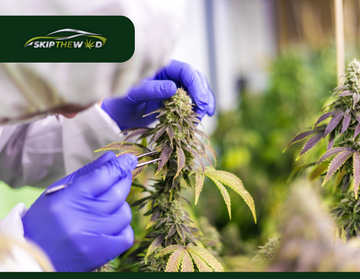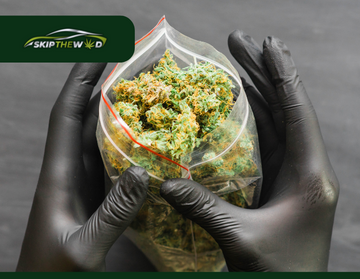Sustainability is now a key focus in many industries. The world is facing environmental challenges. The cannabis industry is booming. It's seen as a big opportunity. But, its environmental impact is under scrutiny. As 2024 unfolds, this sector must adopt sustainable practices. The need is urgent. This article looks at the state of sustainability in the cannabis industry. It covers the innovations driving change, the challenges, and the opportunities ahead. Examining these aspects will help us. We can then evolve the industry. It must meet the demand for eco-friendly practices while keeping its momentum.
The Environmental Impact of Cannabis Cultivation
Energy Consumption
A major environmental concern in the cannabis industry is its energy use. Indoor cultivation, which dominates much of the market, is particularly energy-intensive. Growing plants requires high-intensity lighting, ventilation, and climate control. But it uses a lot of electricity. A 2020 study estimated that cannabis growing in the U.S. used about 1% of its total electricity. Experts expect this number to increase with the expansion of legal markets in 2024.
To address this, a movement is growing. It seeks to use renewable energy, like solar and wind, in cannabis cultivation. Some growers are using energy-efficient tech, like LEDs. They use far less power than traditional high-pressure sodium lamps. Also, real-time data is making automated energy-use systems more common. These systems can adjust lighting, temperature, and humidity to save energy. This makes for a more sustainable cultivation process.
Water Usage
Water usage is another critical area of concern. Cannabis needs a lot of water to grow, especially in the flowering stage. It is a water-intensive crop. In regions where water scarcity is an issue, this can place a strain on local resources. Traditional irrigation methods can also lead to water waste through runoff and evaporation.
To reduce these effects, many cannabis growers are using better irrigation. Drip irrigation, for example, delivers water to the plant roots. It minimizes waste and conserves water. Some growers are using water recycling systems. They capture and reuse runoff water. This further conserves this precious resource. These practices cut the environmental impact of cannabis farming. They can also lower costs. So, they are a win-win for the industry.
Soil Health and Pesticides
Soil health in cannabis farming is key to sustainability. Conventional farming uses chemical fertilizers and pesticides. They can harm the soil and surrounding ecosystem over time. Excessive use of these chemicals can erode soil, harm biodiversity, and contaminate water.
Organic farming methods offer a more sustainable alternative. Growers can use natural fertilizers and pest control methods. This will maintain soil health and support a more diverse ecosystem. Crop rotation and cover crops can boost soil fertility. They can also cut the need for chemical inputs. There is a growing shift to organic practices in the cannabis industry. More growers are seeking organic certification for their products.
At Skip the Weed, we value supporting eco-friendly growers who focus on soil health. We commit to sustainability. We choose products from growers with a commitment to organic methods. This ensures our offerings align with our values and those of our customers.
Innovations Driving Sustainability in the Cannabis Industry
Green Technologies
Innovation is at the heart of the cannabis industry's push toward sustainability. Green technologies are key to reducing the environmental impact of farming. One of the most promising developments in this area is the use of LED lighting systems. Unlike traditional lighting, LEDs are more energy-efficient. They also produce less heat. So, there is less need for cooling systems. It lowers energy use and extends equipment life, reducing waste.
Vertical farming is another innovation that is gaining traction in the cannabis industry. Vertical farms grow plants in stacked layers. This saves space and reduces land and water use. These farms often operate in controlled environments. They control temperature, humidity, and light with exact adjustments. This results in higher yields and better product quality, with less environmental impact.
Automated systems are also revolutionizing the way cannabis is grown and processed. These systems use sensors and data analytics. They track plant health, optimize resource use, and harvest at the perfect time. Automation can reduce human error, increase efficiency, and cut waste. These technologies help large-scale operations. They are now accessible to smaller, boutique growers.
Packaging Solutions
Packaging is a significant contributor to the cannabis industry's environmental impact. Child-resistant and tamper-evident packaging must meet legal standards. This often leads to the use of plastics, which are not eco-friendly. As demand for sustainable products rises, the industry seeks new packaging.
Biodegradable packaging from hemp, cornstarch, and recycled paper is a viable solution. These materials are more eco-friendly. They reduce the product's carbon footprint. Also, some companies are exploring reusable packaging. Customers can return it for refills. This will reduce waste.
Minimalistic packaging designs are also becoming popular. These designs use less material. They lower the environmental impact and attract eco-conscious consumers. Skip the Weed is dedicated to using sustainable packaging. Our customers can enjoy their purchases, knowing they are helping the environment.
Waste Management
Waste management is another area where the cannabis industry faces challenges. Cannabis cultivation and processing create various types of waste. This includes plant material, packaging, and chemicals. Careless discarding of such waste endangers ecosystems and human well-being alike.
To address this, many cannabis companies are implementing comprehensive waste management strategies. The strategies are to compost plant material, recycle packaging, and to dispose of chemicals. Some companies are working with waste management firms that specialize in cannabis waste. This ensures processing all materials in an eco-friendly way.
The Role of Regulation in Promoting Sustainability
Government Policies and Incentives
Government regulations are key in shaping the cannabis industry's sustainability practices. Many regions are tightening environmental rules. They aim to cut the industry's carbon footprint and conserve natural resources. These regulations often include requirements for energy efficiency, water conservation, and waste management.
Governments dangle carrots to spur green industry practices. Tax breaks beckon. Grants tempt. Subsidies entice. These incentives aim to nudge businesses toward sustainability. They reward green choices with financial perks. Smart policies leverage economic tools to foster environmental stewardship. They are for companies that adopt green technologies or earn certain sustainability certifications. These policies promote environmental responsibility. They also help smaller companies by cutting the costs of sustainable practices.
Industry Standards and Certifications
In addition to regulations, industry standards are pushing the cannabis industry toward sustainability. Certifications like USDA Organic, Fair Trade, and GAP guide sustainable farming and processing. These certifications help consumers find products that meet high environmental and ethical standards. They enable better purchasing decisions.
The cannabis industry is seeing new sustainability certifications. One is the Sun+Earth Certified label. It focuses on organic farming and ethical labor practices. These certifications matter more now. Consumers want transparency from the companies they support.
At Skip the Weed, we are proud to offer high-quality, sustainable cannabis. Our products meet rigorous standards to ensure this. By choosing products with reputable certifications, we support a sustainable industry.
Consumer Demand for Sustainable Cannabis
Shifting Consumer Preferences
Consumer demand is a powerful force in driving sustainability within the cannabis industry. As concern for the environment grows, more consumers want eco-friendly products. Consumer preferences are shifting. They are now favoring greener practices. As a result, the industry is adopting them, from cultivation to packaging.
Eco-conscious consumers are prioritizing sustainably sourced, organically grown products. They want eco-friendly packaging, too. This demand is not only changing the way cannabis is produced but also shaping the way it is marketed and sold. Sustainable companies are more likely to attract and keep these consumers.
Skip the Weed recognizes the importance of responding to this demand. We carefully choose our products to meet high sustainability standards. We offer eco-friendly options. They support our customers' wellness goals without harming the planet.
Educating Consumers
Consumer demand for sustainable products is growing. But we need to educate people on what sustainability means in the cannabis industry. Many consumers may not grasp the full environmental impact of their choices. They also may not know how to find truly sustainable products.
Education is essential for empowering consumers to make well-informed decisions. Companies can help by providing clear information on their sustainability practices. This includes how they source, manufacture, and package their products. Transparency is key to building trust and promoting sustainable habits.
Challenges and Opportunities in Achieving Sustainability
Barriers to Sustainability
The cannabis industry is making progress. But it faces challenges in achieving full sustainability. One of the primary barriers is the cost associated with implementing sustainable practices. Green technologies, organic farming, and sustainable packaging can be costly. They are especially so for small and medium-sized businesses. These costs can make it hard for some companies to compete in a market where consumers care about price.
Another challenge is the regulatory landscape. It can vary widely by region. In some areas, regulations may not support or incentivize sustainable practices. This makes it harder for companies to adopt them. Also, the lack of standard sustainability metrics can cause confusion. It affects how the industry defines and measures sustainability.
Opportunities for Growth
Despite these challenges, there are vast opportunities to grow in cannabis sustainability. As demand for eco-friendly products grows, companies must adopt sustainable practices. Those that do are likely to gain market share and brand loyalty. Green tech and sustainable farming offer a chance to stand out in a crowded market.
Working together in the industry can help with sustainability. Companies can work together by sharing best practices, resources, and technologies. This will cut costs and improve the industry's sustainability. Partnering with environmental groups and joining industry initiatives can boost these efforts.
At Skip the Weed, we see these challenges as opportunities to lead by example. We want to help create a greener cannabis industry. To do this, we will improve our sustainability practices. We will also collaborate with like-minded partners.
The Future of Sustainability in the Cannabis Industry
Emerging Trends
As we look to the future, some trends will likely shape cannabis sustainability. A major trend is the rise of regenerative farming practices. Regenerative farming, unlike conventional farming, aims to restore the ecosystem. Conventional farming can harm natural resources. This approach improves soil health and sequesters carbon. It helps fight climate change.
Another trend is the integration of circular economy principles into the cannabis industry. The circular economy aims to reduce waste and maximize resource use. It does this through recycling, reuse, and designing products for a longer lifespan. In the cannabis industry, this could mean innovations. These include reusable packaging, closed-loop systems for water and nutrients, and repurposing waste.
Tech advancements will be key to cannabis sustainability in the future. As green technologies evolve, they will become cheaper and easier to access. More companies will adopt sustainable practices as a result. There is great potential in using blockchain for supply chain transparency. Blockchain can provide a permanent record of every step in the production process. It can help ensure that sustainability claims are credible and verifiable.
Long-Term Impact
The cannabis industry's sustainability will affect the environment, consumers, businesses, and communities. As more companies go green, the industry's environmental impact will fall. This will aid global efforts to combat climate change and save resources.
The shift to sustainability will give consumers better access to products. These will align with their values, boost their well-being, and not harm the planet. Sustainable businesses will gain consumers' trust and loyalty. They may also cut costs by reducing waste and improving efficiency.
Communities, especially in areas where cannabis is grown, will benefit. Sustainable practices can improve ecosystems. They can also clean the air and water. Finally, they can make local economies more resilient. If the cannabis industry prioritizes sustainability, it can help the environment and society.
Conclusion
Sustainability is not just a buzzword in the cannabis industry—it is a necessity. As the industry grows, sustainable practices will be vital. They are key to long-term success and to benefiting the environment and society. The industry can improve its sustainability in many areas. These include energy use, water use, packaging, and waste management.
At Skip the Weed, we support a sustainable cannabis industry. We will provide eco-friendly products. They must align with our values and those of our customers. They should support personal wellness and the planet's health. We are excited to see future innovations in sustainability.









